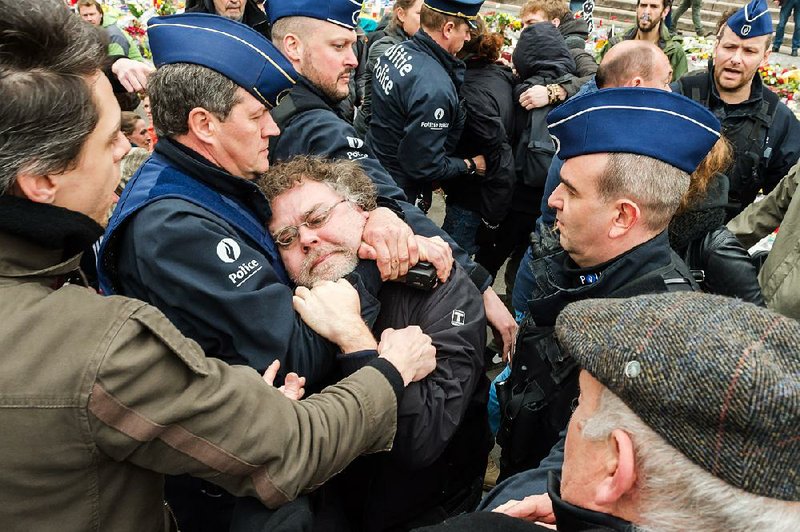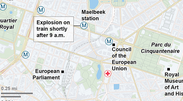BRUSSELS -- Partial airline service will begin today at Brussels Airport after a 12-day shutdown of passenger flights caused by a deadly bombing attack, the airport's chief executive officer said Saturday.
RELATED ARTICLE
http://www.arkansas…">Bomber's return spotlights security gaps
Arnaud Feist, CEO of Brussels Airport Co., said the Brussels Airlines flights to Athens in Greece, Turin in Italy, and Faro in Portugal, the first of which he said should take off today at noon, were chiefly symbolic.
Effective Monday, Belgium's biggest airport should be back at about 20 percent of capacity and able to process 800 passengers an hour.
It has been closed since suicide bombings in the airport's main terminal and a Brussels subway station killed 32 people and wounded 270 on March 22.
Speaking at a joint news conference, Feist called it "a sign of hope" and a demonstration of "shared will" that even partial passenger service could resume so soon after what he called "the darkest days in the history of aviation in Belgium."
He said he expected the formal go-ahead from the Belgian government later Saturday.
The March 22 attacks, in which the three bombers also died, were claimed by the Islamic State militant group.
To minimize the chances of a repeat, Belgian Federal Police spokesman Michael Jonniaux said new security measures have been ordered at the airport, including spot-checks of vehicles before they arrive, the closing of a drop-off parking area outside the terminal, and the screening of all people, identification and travel documents, and baggage before they are allowed to enter the facility.
The bombers had been able to enter the airport's check-in area with suitcases packed with explosives and nails, and the resulting blasts collapsed the ceiling, shattered windows and caused other damage.
Until the terminal can be fully repaired, Feist said, departing passengers will first enter a temporary structure erected on the tarmac, then go to a specially built area for check-in.
There will be no access by rail or public transport to the airport for the foreseeable future, he said.
Brussels Airport, which usually handled about 600 flights a day, served about 1.5 million people in February, the month preceding the attack. Feist said he hopes full service can be restored by the end of June or beginning of July in time for the summer vacation season.
Delta said Saturday that it was suspending service between Atlanta and Brussels until March next year because of the continued uncertainty surrounding the airport's reopening and weakening demand for flights to the city. It said it still plans to resume service between New York's John F. Kennedy airport and Brussels once the Brussels airport provides clearance.
Also Saturday, Belgian police, some on horseback, moved in to detain about two dozen people at Brussels' Bourse Square, breaking up a demonstration to protest prejudice against Muslims. Authorities in the Belgian capital, fearing violent disorders, banned all demonstrations after protesters congregated at the same square March 27.
And in Molenbeek, according to Brussels media outlets, two protesters were arrested after "prohibited weapons" and Molotov cocktails were found in their vehicle. They were trying to take part in a planned anti-immigration rally in Molenbeek.
Molenbeek's mayor, Francois Schepmans, quickly banned that protest because of the potential "public order disturbances" it posed.
Molenbeek, home to one of the largest Muslim communities in Brussels, has been seen as a hotbed of radical Islamic sentiment and was home to some of the men who staged the Nov. 13 attacks in Paris that killed 130, which also were claimed by the Islamic State group.
Belgian held as plotter
The Belgian prosecutor's office announced Saturday that a Belgian has been charged with participating in the activities of a terrorist group for his purported role in another plot to attack France, which was uncovered after the arrest of a Frenchman and the discovery of a cache of weapons and explosives.
A statement from the prosecutor's office identified the 33-year-old Belgian suspect only as Y.A. It said he's in custody and has been charged in the case that stemmed from the arrest of Reda Kriket, 34, in the Paris suburb of Boulogne-Billancourt on March 24.
Prosecutors declined to provide further information on Y.A. "in the interest of the investigation."
Kriket was charged on numerous counts, including terrorist conspiracy and possession of weapons.
Paris prosecutor Francois Molins said an "imminent" attack had been thwarted with Kriket's arrest and the discovery of the explosives stash in suburban Argenteuil outside Paris.
Two other people have been arrested and charged in Belgium with helping Kriket: Abderrahmane Ameroud, 38, and a man identified only as Rabah M., 34, both Algerian citizens. They were arrested March 25 in Brussels.
Another man accused of being an accomplice, Anis Bahri, a 32-year-old French citizen, was arrested by the Dutch police in the port city of Rotterdam on March 27 at the request of the French authorities.
Kriket was convicted in absentia in July alongside Abdelhamid Abaaoud, the man believed to be the on-the-ground organizer of the Paris attacks, in the same Belgian court case involving a jihadi recruitment network.
But the plot Kriket was believed to be involved in was not connected to the attacks in Brussels or in Paris, according to French officials.
Information for this article was contributed by John-Thor Dahlburg, Elaine Ganley, Helene Franchineau and Bishr Eltouni of The Associated Press; by Aurelien Breeden and Sewell Chan of The New York Times; and by James McAuley of The Washington Post.
A Section on 04/03/2016





